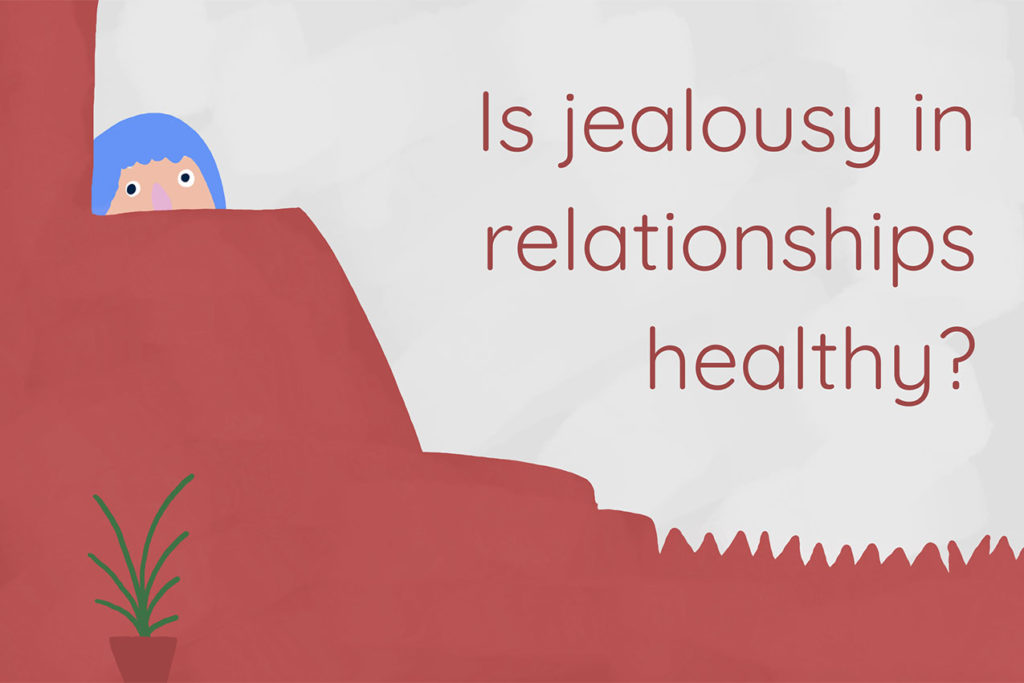Is jealousy in relationships healthy?
by Andres Carrion | March 2022
Jealousy is a complicated emotion that stems from feelings of insecurity and fear of losing something. People worry that their partner may be unfaithful and break their relationship agreement or fall in love with someone else. For a long time, many people have argued about whether jealousy is healthy in a relationship. Opponents of jealousy have argued that it is a toxic emotion that introduces trust issues and unnecessary arguments. Whereas proponents of jealousy have argued that jealousy shows that you love your partner and you are worried about losing them. So, which is it?
Research and relationship experts suggest that it is both. Jealousy is a complicated emotion and the answer is also complicated. There is both healthy and unhealthy jealousy in relationships.
Healthy jealousy could be triggered when your partner’s behavior or another person threaten the safety you feel in your relationship. If you feel this way, then you should use positive communication strategies to talk to your partner about it. This means being specific about the trigger, but more importantly, being specific about how you are feeling. In turn, your partner may feel loved and grateful that you brought it up. It’s okay to need a little reassurance from time to time and a loving partner would be more than happy to provide that. If you are feeling a little threatened, do not be hard on yourself and talk to your partner.
Unhealthy jealousy, on the other hand, is present in relationships that lack trust and healthy communication. Jealousy in such relationships becomes unhealthy when we allow it to consume us:
- Controlling partners: not letting partners hang out with friends.
- Unwarranted suspicion: doubting your partner’s fidelity without actual evidence.
- Creating suspicions: ruminating on situations and seeking “evidence” that may not actually exist.
If you find yourself constantly dealing with jealousy in your relationship, there are a couple things to consider. First, communication is key. Rather than assuming the worst or creating fake scenarios, talk to your partner about how you have been feeling. Avoid being accusatory. Couples therapy and relationship-focused individual therapy can also be helpful. Couples therapy can provide skills to communicate better with each other and build trust. Individual therapy can help with self-esteem issues and anxieties that may be contributing to your jealousy and trust issues.
While our physical offices are located in South Loop and Lakeview neighborhoods in Chicago, Illinois for in-person sessions, we also welcome and serve clients for online therapy from anywhere in Illinois and Washington, D.C. Clients from the Chicagoland area may choose in-office or online therapy and usually commute from surrounding areas such as River North, West Loop, Gold Coast, Old Town, Lincoln Park, Lake View, Rogers Park, Logan Square, Pilsen, Bridgeport, Little Village, Bronzeville, South Shore, Hyde Park, Back of the Yards, Wicker Park, Bucktown and many more.
At Roamers Therapy, our psychotherapists are here to support you through anxiety, depression, trauma and relationship issues, race-ethnicity issues, LGBTQIA+ issues, ADHD, Autism, or any challenges you encounter. Our psychotherapists are trained in Cognitive Behavioral Therapy, Dialectical Behavioral Therapy, Psychodynamic Therapy, Acceptance, and Commitment Therapy, Person-Centered Therapy, and Gottman Therapy.
Whether you’re seeking guidance on a specific issue or need help navigating difficult emotions, we’re ready to assist you every step of the way.
Contact us today to learn more about our services and schedule a session with our mental health professionals to begin your healing journey. To get started with therapy, visit our booking page.
First, decide if you’ll be paying out-of-pocket or using insurance. If you’re a self-pay client, you can book directly through the “Book Now” page or fill out the “Self-Pay/Out-of-network Inquiry Form.” If you’re using insurance, fill out the “Insurance Verification Form” to receive details about your costs and availability. Please let us know your preferred therapist. If your preferred therapist isn’t available, you can join the waitlist by emailing us. Once your appointment is confirmed, you’ll receive intake documents to complete before your first session.
This page is also part of the Roamers Therapy Glossary; a collection of mental-health related definitions that are written by our therapists.
While our offices are currently located at the South Loop neighborhood of Downtown Chicago, Illinois, we also welcome and serve clients for online therapy from anywhere in Illinois and Washington, D.C. Clients from the Chicagoland area may choose in-office or online therapy and usually commute from surrounding areas such as River North, West Loop, Gold Coast, Old Town, Lincoln Park, Lake View, Rogers Park, Logan Square, Pilsen, Bridgeport, Little Village, Bronzeville, South Shore, Hyde Park, Back of the Yards, Wicker Park, Bucktown and many more. You can visit our contact page to access detailed information on our office location.

